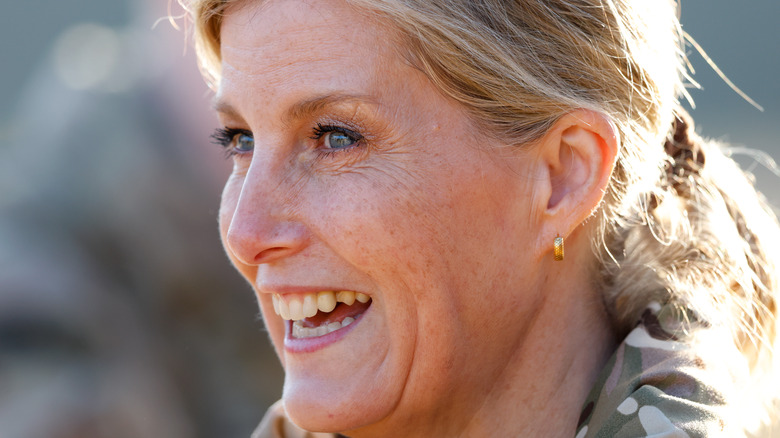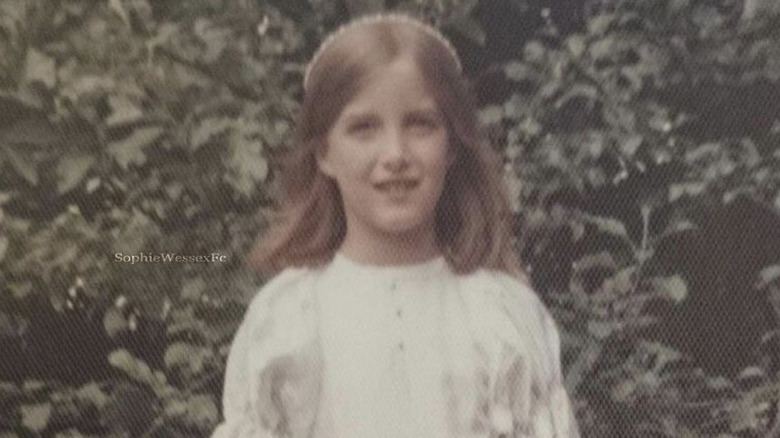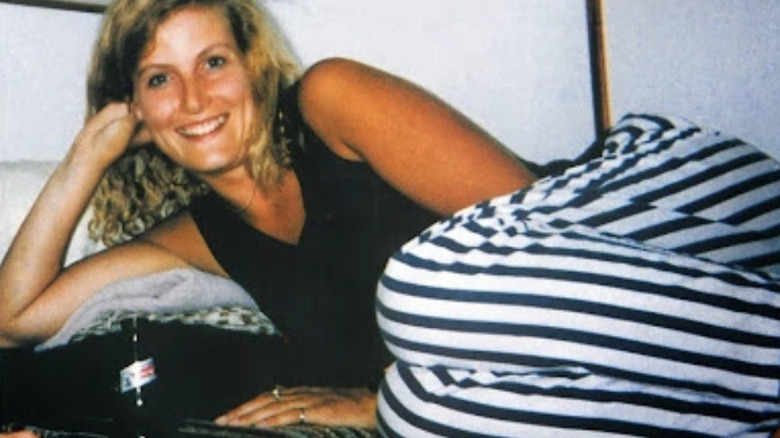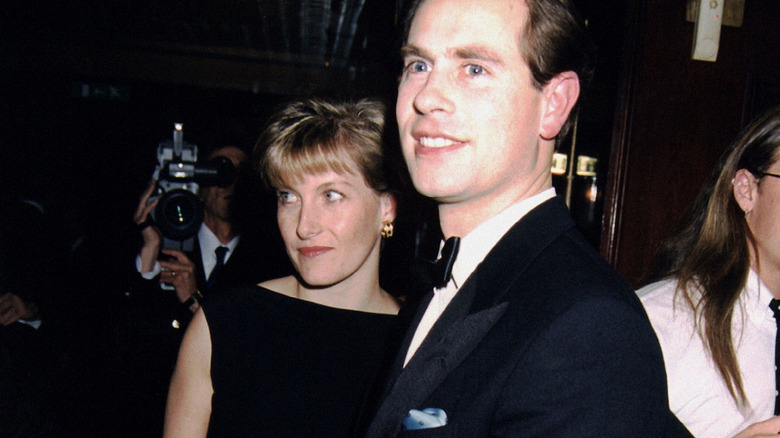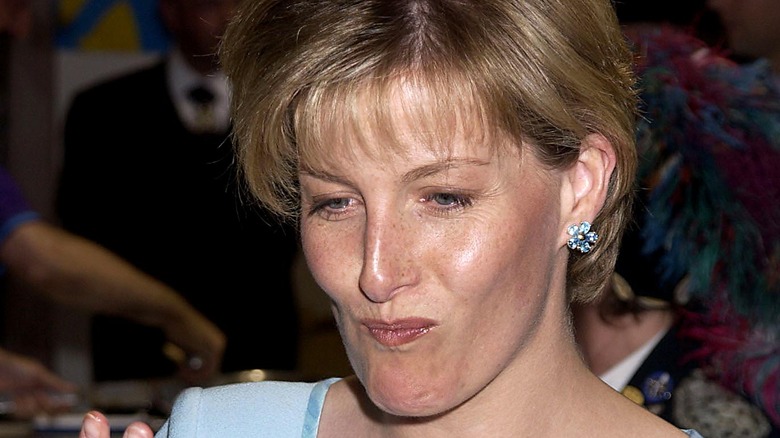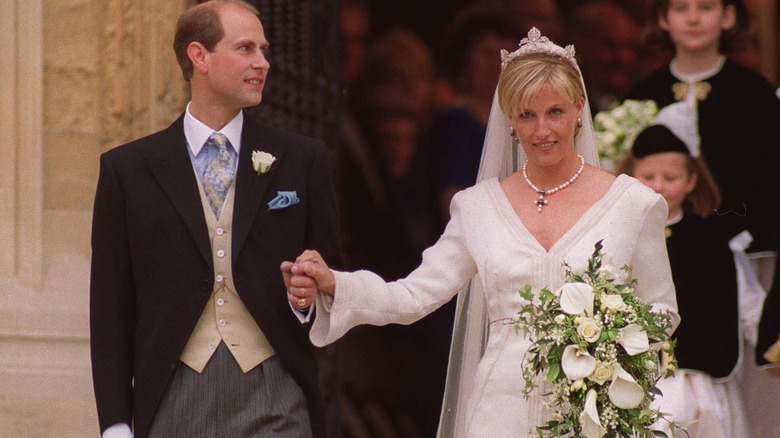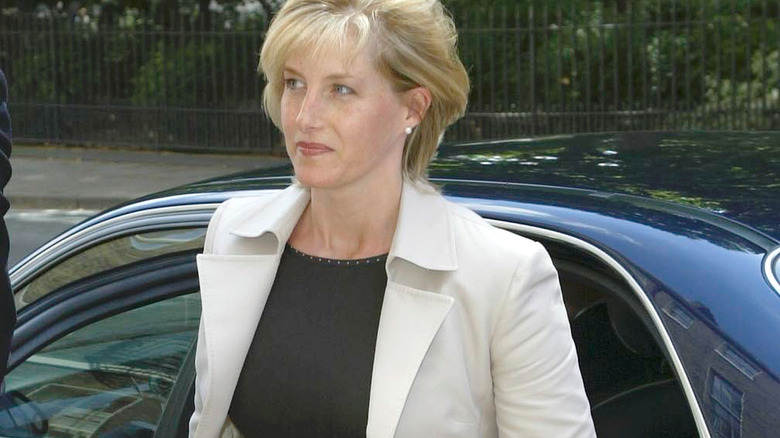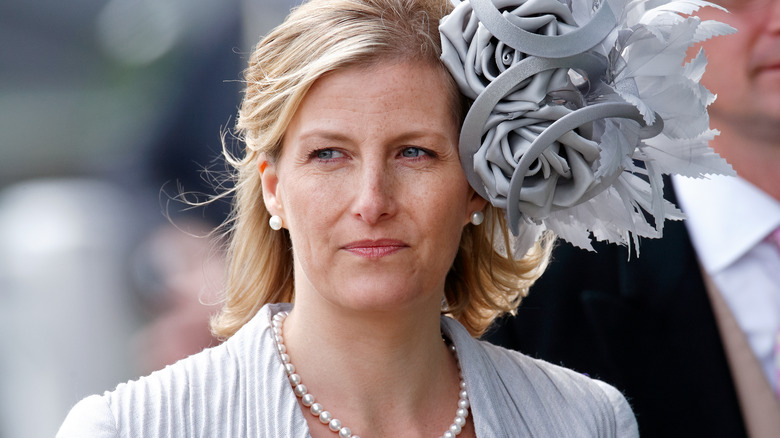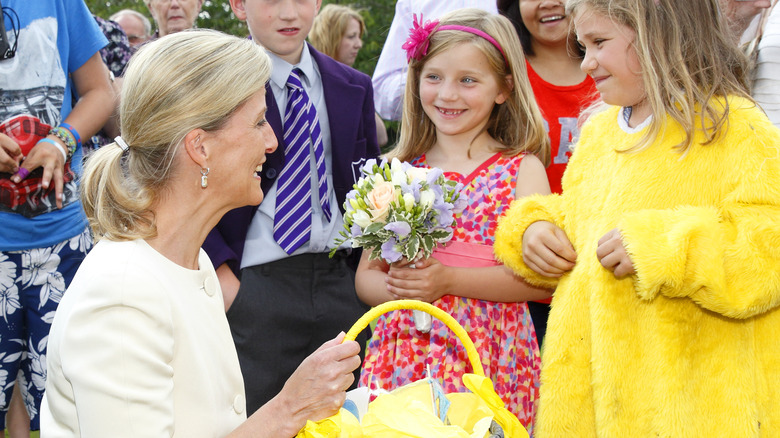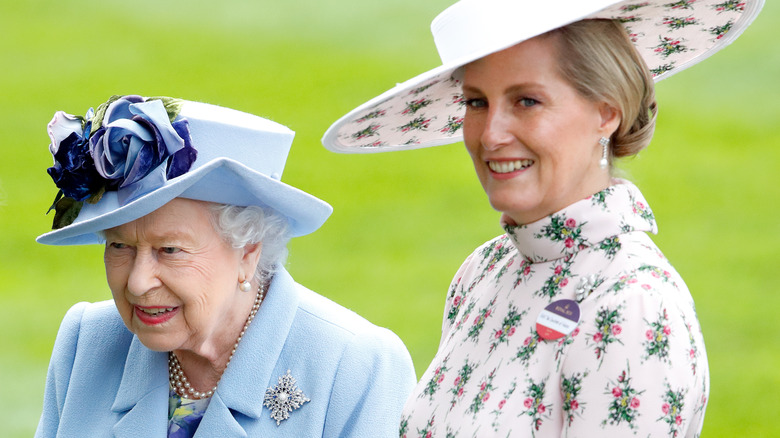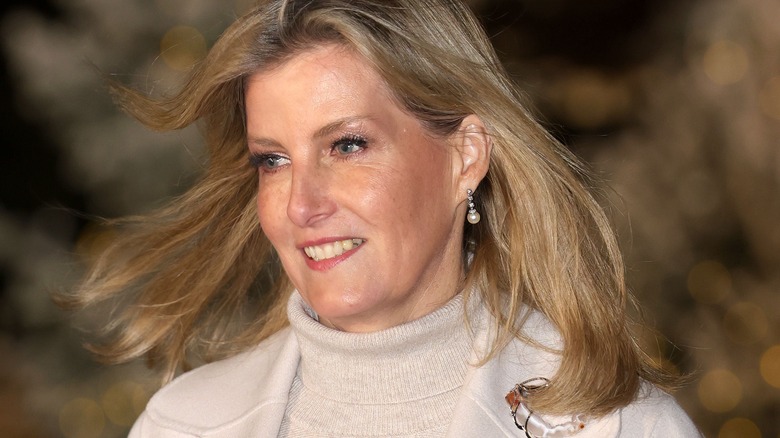Sophie, Countess Of Wessex Was Never The Same After She Married Prince Edward
These days, Sophie, Countess of Wessex is known as something of an unexpected helper for the British royal family. More than one media outlet has fondly labeled her the senior royals' "secret weapon" — a nickname that originated with former BBC presenter, Jennie Bond (via Daily Express) — and several royal experts have exalted her for her dedication to the crown. As royal historian, Marlene Koenig, revealed in an interview with Daily Express, "I suspect that [Sophie] is highly regarded within the family. There are no scandals. She is happy to pick up new patronages and go out and fly the flag for the U.K. I suspect Charles likes her, again, because she is down to Earth, and she is dependable."
Indeed, the Countess of Wessex is said to be crucial when it comes to engaging with Prince Harry and Meghan Markle. One of Sophie's former aides even told The Telegraph: "Like Meghan, [Sophie's] not only had a professional life before royalty but she also knows what it feels like to be vilified in the press. She understands what Harry and Meghan are going through." Thus, Sophie has earned a reputation for being something of a royal peacemaker.
While Sophie is now known as an integral member of the royal family, she was once a typical British middle-class girl. Before marrying Prince Edward and entering into royalty, Sophie led a free-spirited existence, working odd jobs and adventuring across the globe. The day that she told Prince Edward "I do," however, changed her life forever.
Before entering royal life, Sophie had a normal childhood
Although Sophie, Countess of Wessex has grown into a key member of the royal family, she was hardly born into the role. Unlike her husband, Prince Edward, who received extensive training to prepare him for palace life, Sophie was raised in a more typical setting. When she entered the world on January 20, 1965, the future Countess of Wessex had no titles and was thus known simply as Sophie Rhys-Jones. She grew up in small village in Kent with parents who likely never imagined that their daughter would one day marry into Britain's most famous family. As royal expert, Rebecca English, revealed in the Channel 5 documentary "Edward & Sophie: The Reluctant Royals" (via YouTube), Sophie "enjoyed ... a comfortable upper-middle-class upbringing. Her father was a tire importer. Her mother was a secretary and charity worker."
Sophie may not have been raised in a royal environment, but that did not prevent her from getting a top-notch education. She started out at the exclusive Dulwich Preparatory School, and, when she got older, enrolled at Kent College, Pembury. Sophie ultimately headed off to West Kent College, Tonbridge, where she underwent secretarial training. In the same Channel 5 documentary, royal journalist Ayesha Hazarika explained that the intensity of Sophie's academic background actually stemmed from her parents' emphasis on learning: "They were not super wealthy, but they believed in investing in education, and they had a respectability about them."
She didn't fit the typical image of a royal wife
It's no secret that the women of the British royal family receive much more media scrutiny than their male counterparts. Perhaps due to this dynamic, royal princes were, for many years, encouraged to select their brides based on the so-called "decency" of their past behavior. The most obvious example of this is possibly the romance between King Charles and Camilla, Queen Consort. Back in the day, King Charles was apparently encouraged not to marry Camilla because of her history as a party girl. As royal expert Penny Junor wrote in her book "The Firm" (via Google Books), "[A]ny 'past' always ruled [women] out as possible brides. Camilla Parker-Bowles ... fell into that category."
Interestingly, when Prince Edward started dating Sophie Rhys-Jones in 1993, his future wife already had quite a bit of a past. During her youth, Sophie had worked in a bar, before later setting off to Switzerland, where she became a concierge at a ski resort. During this time, she fell for an Australian ski instructor, who she followed back to his home country. She remained "Down Under" even after the pair ultimately parted ways, and traveled the country with a yacht enthusiast. These adventures, however, weren't expected of a royal bride of Sophie's generation. As royal expert Garth Gibbs revealed in the documentary "Diana & Sophie: The Tale of Two Royal Marriages" (via YouTube), "[Sophie's] been around the block. She's had a couple of flings."
She met Prince Edward while working
Sophie, Countess of Wessex is not only considered a unique royal bride in terms of her past; she also stands out from other high-ranking women of her generation because of the way she met Prince Edward. Many of the more "typical" royal wives her age met their beaus through family or other close connections. Sarah Ferguson, for example, grew up in the same circles as Prince Andrew, and her father even coached then-Prince Charles' polo team. Similarly, Princess Diana had such strong familial ties to the monarchy that she was one of Edward's playmates during her childhood.
Sophie Rhys-Jones, on the contrary, didn't grow up with any of the same royal connections. She didn't have the chance to meet Prince Edward until 1993, and, when they did eventually get the chance to talk, it was at one of her work functions. At the time, Sophie was employed at the public relations firm, Maclaurin Communication and Media. The group happened to be in charge of the publicity for the Prince Edward Challenge — a tennis-based charity event organized by the prince himself. When the star of the event, tennis powerhouse Sue Barker, called off a photo shoot with Edward, Sophie stepped up and took the professional athlete's place. From there, sparks flew. In her book "Prince Edward" (via Express), royal biographer Ingrid Seward noted, Edward "surreptitiously asked her for her telephone number that day they met."
Sophie struggled with media attention
Perhaps due to her status as a working girl who had adventured across the globe, Sophie, Countess of Wessex suffered greatly at the hands of the British media. During the early years of her romance with Prince Edward, tabloids would compare her unfavorably to Princess Diana. As royal expert, Kinsey Schofield, told Fox, "There were constant comparisons of the women, and some royal watchers even accused Sophie of trying to 'steal Princess Diana's style.'" Sophie spoke out against the way the press portrayed her as a faux version of the People's Princess. Daily Mail quoted her frustration: "The public have put me on the plinth vacated by Diana." She continued, "I don't deny that we do look alike ... but I couldn't ever compete with Diana's image. I am not Diana."
Unfortunately, Sophie's struggle with the press reached its peak in 1999 when The Sun published a topless photo of Prince Edward's future bride. The photograph had been taken in Spain, just over a decade before. Its publication for all of Britain to see left Sophie feeling absolutely humiliated. In the documentary "Edward & Sophie: The Reluctant Royals" (via Express), Sophie's friend and former business partner, Murray Harkin, recalled: "I remember Sophie ringing me in the early hours of the morning, in floods of tears when she discovered that The Sun had bought the picture and was planning to publish it. She was so upset."
If you or anyone you know has been a victim of sexual assault, help is available. Visit the Rape, Abuse & Incest National Network website or contact RAINN's National Helpline at 1-800-656-HOPE (4673).
Prince Edward and Sophie wanted a simple wedding
The British tabloids were, at times, extremely disrespectful of Sophie, Countess of Wessex. Therefore, it probably wasn't astounding when Prince Edward asked members of the press for privacy leading up to their wedding, even implying that they could stand down. At a press conference held at St. James Palace, a journalist asked the pair, "What kind of wedding are you planning?" Prince Edward shot back a cheeky reply: "A private one, hopefully."
In the end, despite their desire for a more intimate wedding, Edward and Sophie's nuptials were televised and viewed by 200 million people from around the world. Even so, the event was a modest affair when compared to other royal unions of that generation. There was no military presence at their wedding, nor was it considered an official state ceremony. As a result, the couple was permitted to enjoy a slightly more exclusive event, even if it still captured the interest of the public.
Interestingly, privacy wasn't the only anti-royal thing that Edward and Sophie requested at their wedding. Apparently, the couple asked guests to break tradition and attend the event without any of the fancy hats that British royals are so famous for wearing. Elizabeth, The Queen Mother blatantly ignored this rule and showed up at the wedding in an enormous purple feather hat.
She tried to work even after marrying Prince Edward
Although Sophie, Countess of Wessex suffered considerably due to the ruthlessness of the British press, she did her best to maintain a sense of normalcy in her life. One of the ways that she sought to do so was by continuing her career, rather than following the traditional path of becoming a full-time working royal. Unlike other royal wives, particularly Princess Diana and Sarah Ferguson, Sophie owned her own company at the time of her royal wedding. In fact, during the courtship phase of her relationship with Prince Edward, Sophie joined forces with her friend, Murray Harkin, to co-found a public relations firm, which they dubbed R-J H.
Years later, Sophie publicly recognized just how unconventional her career choice was for a royal woman of her generation. As the countess shared in a speech at a dinner for the 100 Women in Hedge Funds (via Daily Mail), "I am rare because I am one of the few ladies in the British Royal Family who has had a professional business career and their own company." However, Sophie's non-traditional path could be seen as a strength. In her speech, the countess expressed that her past career had the potential to help her understand issues related to women in business: "So perhaps I am able, through my own experience, to have a deeper appreciation of the corporate world and what it's like to have to climb the career ladder."
However, Sophie's career wasn't compatible with royal life
Sophie, Countess of Wessex may have tried to pursue her own career outside of the royal family, but ultimately, her efforts towards maintaining a sense of normalcy fell short. In 2001, just two years after officially joining royalty, Sophie was targeted by a British tabloid writer who disguised himself as a potential client for the countess' public relations firm, R-J H. Under the guise of considering R-J H for a sizable PR account, the writer met with Sophie and recorded her making several inappropriate statements about British politicians. The countess was caught red-handed saying then-Prime Minister Tony Blair was "ignorant of the countryside." She also made negative comments about the prime minister's wife, Cherie Blair, who Sophie described as, "even worse" (via Daily Mail).
For Sophie, this incident wasn't just hugely embarrassing — it was also career-ending. For one thing, as a member of the royal family, Sophie was supposed to remain apolitical. For another, the tapes showed that Sophie faced a conflict of interests when it came to running her business and maintaining her position as the wife of a British prince. Shortly after the tapes were released, Sophie resigned from her PR company. The Irish Times quoted the countess' apology: "I am deeply distressed by the carrying out of an entrapment operation on me and my business but I also much regret my own misjudgment in succumbing to that subterfuge."
She had to take on a traditional royal role
Once it became clear that Sophie, Countess of Wessex could not continue to balance her career with her title, the vivacious blond began to devote her attention to royal life. In 2002, she officially committed herself to the call of the crown and became a full-time working royal. In the Channel 5 documentary, "Edward & Sophie: The Reluctant Royals" (via YouTube), royal journalist Rebecca English explained the countess' struggle: "In a way, Sophie and Edward were the Harry and Meghan of their day. They had this idea that they could support the Queen with a limited amount of royal duties but also pursue lucrative commercial careers of their own ... [T]his doesn't actually work."
Rather than try to exit the royal family to focus on her career, the Countess of Wessex poured her energy into serving the crown. With the approval of Queen Elizabeth, Sophie and Edward doubled their royal commitments. Ultimately, this dedication to the monarchy is what allowed Sophie to thrive in her new role. As royal expert, Duncan Larcombe, told GoodtoKnow, "Both Meghan and Sophie's initial struggles show just how difficult it is for somebody who has a successful career to join the Royal Family." Larcombe continued, "Sophie didn't have an easy ride and you could argue that it was worse than Meghan's arrival into the Royal Family. But after the scandal she changed her circle of friends and proceeded to transform herself into an ideal royal wife."
She embraced her relationship with the Queen
While it was likely challenging for Sophie, Countess of Wessex to undergo this evolution, her respect for the crown allowed her to build strong relationships with other members of the royal family. One of her closest connections was with Queen Elizabeth, who went out of her way to help Sophie recover from the scandal that brought her career to an end. As royal expert, Duncan Larcombe, revealed to GoodtoKnow, "The Queen in many ways was instrumental in rescuing Sophie [from her PR controversy]." One such demonstration of support for the Wessex's was financial. Following Sophie and Edward's 2002 decision to become full-time working royals, Queen Elizabeth began paying for their living expenses out of her own private funds.
Ultimately, Sophie appears to have lived up to her late mother-in-law's expectations. During the two decades after her PR scandal, the Countess of Wessex did such high-quality charity work that the Queen took note. After all, before her death, Queen Elizabeth left many of her favorite royal patronages to Sophie. As an anonymous royal insider told The Mirror, "The Queen and the countess had a fantastically warm and joyful relationship. Her Majesty admired Sophie's quiet sense of duty, her strong work ethic, and the way she balanced her public and family lives." The source continued, "The Queen's decision to pass on these patronages reflects the closeness of their bond."
Sophie, Countess of Wessex is on the rise
While it's clear that Sophie, Countess of Wessex did not have the easiest time adapting to royal life at first, she has ultimately become a key member of the royal family. Among rumors that King Charles would like to cut certain members out of the monarchy, it seems that Sophie will not be on the chopping block. Prior to her death, Queen Elizabeth is said to have presented her idea of a "New Firm," comprised of six important members, in addition to the Queen and her heir. Both Prince Edward and Sophie were apparently included in this royal dream team, alongside the likes of Camilla, Queen Consort, Princess Anne, Prince William, and Princess Catherine.
Since the Queen's passing, we have seen Sophie step into an expanded royal role. She has taken on many of the duties that would normally belong to the palace's two absent members, Prince Harry and Meghan Markle. As one royal insider divulged to The Sun, the Countess of Wessex, "has been singled out as a person the Palace would like to help ease the burden [left by the Sussex's departure]. She's very popular with other senior royals like Charles and Camilla, and has proved to be extremely good at public engagements."
